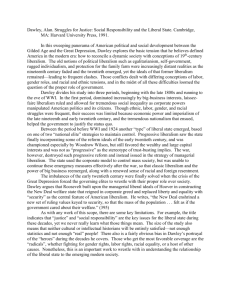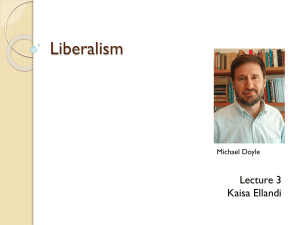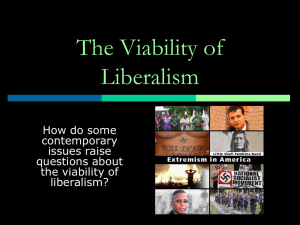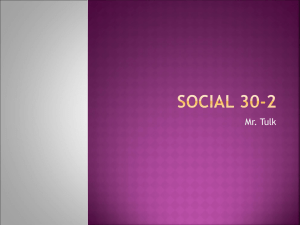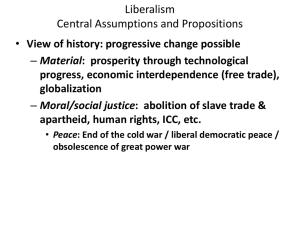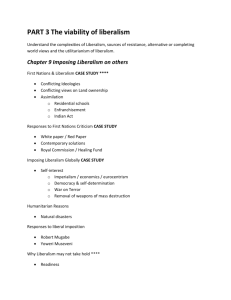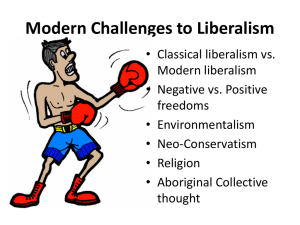Christianity, Enlightenment Liberalism, and the Quest for Freedom
advertisement
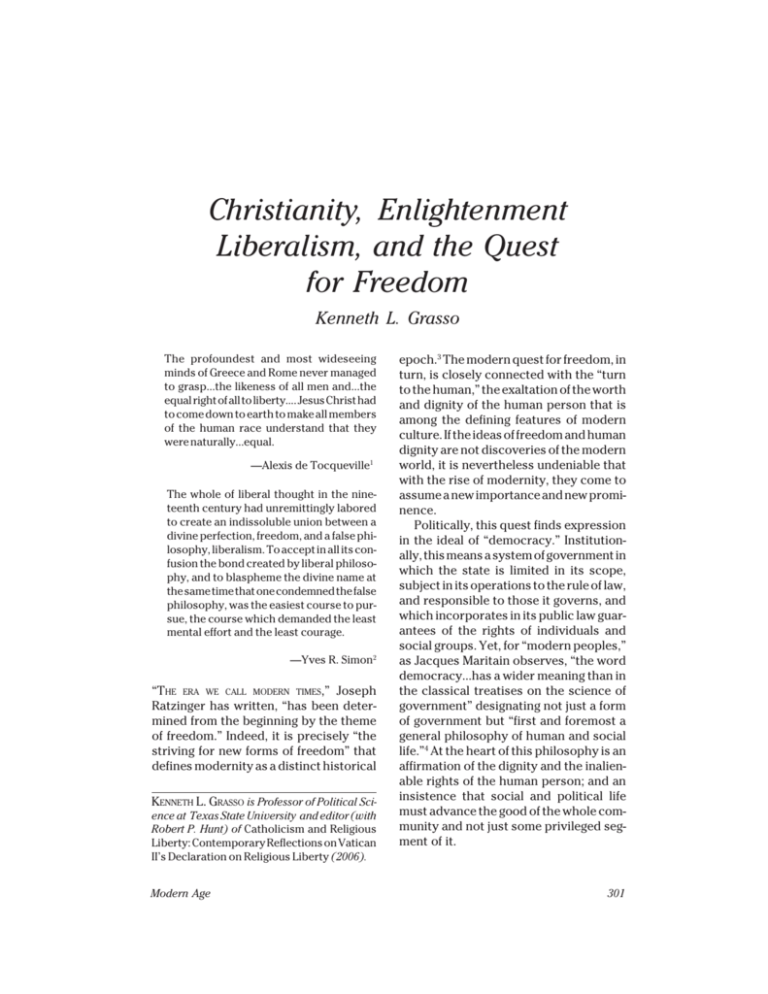
Christianity, Enlightenment Liberalism, and the Quest for Freedom Kenneth L. Grasso The profoundest and most wideseeing minds of Greece and Rome never managed to grasp...the likeness of all men and...the equal right of all to liberty.... Jesus Christ had to come down to earth to make all members of the human race understand that they were naturally...equal. —Alexis de Tocqueville1 The whole of liberal thought in the nineteenth century had unremittingly labored to create an indissoluble union between a divine perfection, freedom, and a false philosophy, liberalism. To accept in all its confusion the bond created by liberal philosophy, and to blaspheme the divine name at the same time that one condemned the false philosophy, was the easiest course to pursue, the course which demanded the least mental effort and the least courage. —Yves R. Simon2 “THE ERA WE CALL MODERN TIMES,” Joseph Ratzinger has written, “has been determined from the beginning by the theme of freedom.” Indeed, it is precisely “the striving for new forms of freedom” that defines modernity as a distinct historical KENNETH L. GRASSO is Professor of Political Science at Texas State University and editor (with Robert P. Hunt) of Catholicism and Religious Liberty: Contemporary Reflections on Vatican II’s Declaration on Religious Liberty (2006). Modern Age epoch.3 The modern quest for freedom, in turn, is closely connected with the “turn to the human,” the exaltation of the worth and dignity of the human person that is among the defining features of modern culture. If the ideas of freedom and human dignity are not discoveries of the modern world, it is nevertheless undeniable that with the rise of modernity, they come to assume a new importance and new prominence. Politically, this quest finds expression in the ideal of “democracy.” Institutionally, this means a system of government in which the state is limited in its scope, subject in its operations to the rule of law, and responsible to those it governs, and which incorporates in its public law guarantees of the rights of individuals and social groups. Yet, for “modern peoples,” as Jacques Maritain observes, “the word democracy...has a wider meaning than in the classical treatises on the science of government” designating not just a form of government but “first and foremost a general philosophy of human and social life.”4 At the heart of this philosophy is an affirmation of the dignity and the inalienable rights of the human person; and an insistence that social and political life must advance the good of the whole community and not just some privileged segment of it. 301 I This essay seeks to explore Christianity’s relationship to the modern quest for freedom. To grasp this relationship it is essential to recall that the rise of Christianity precipitated a revolution in human selfunderstanding. Here it will suffice to mention two aspects of this revolution that are indispensable to an understanding of the topic at hand. To begin with, Christianity effected a dramatic break with the monistic understanding of the structure of social life characteristic of the classical world. “It is an historical commonplace,” as John Courtney Murray has written, to say that the essential political effect of Christianity is to destroy the classical view of society as a single homogeneous structure, within which the political power stood forth as the representative of society both in its religious and political aspects. Augustus was both Summus Imperator and Pontifex Maximus; the ius divinum was simply part of the ius civile.... “Two there are, August Emperor, by whom the world is ruled on title of original and sovereign right— the consecrated authority of the priesthood and the royal power.” In this celebrated sentence of Gelasius I...the emphasis laid on the word “two” bespoke the revolutionary character of then Christian dispensation.5 Implicit in Christianity’s distinction between Church and state introduced by Christianity and insistence on the freedom of the Church both to define itself and to discharge its divinely appointed mission, moreover, were a host of other political principles including the distinction between state and society; normative pluralism, the idea that our nature as social beings finds expression in a whole array of diverse institutions and communities that collectively constitute society; limited government, the idea that the jurisdiction of the state is “limited to the pursuit of certain enumerated secular purposes,” that goals of government were not coextensive with the overall goals of 302 human life; and the primacy of society over the state, the idea that the state possesses a service character and thus exists to serve, to assist, society rather than vice versa. Implicit in the Christian notion of diarchy, in short, lay “the virtualities of a great revolution,” a revolution of such magnitude as to mark “the beginning of a new civilizational era.”6 Secondly, there is what Glenn Tinder describes as Christianity’s exaltation of the individual.7 This exaltation occurs in part as a consequence of the emergence, under the impact of Christianity, of “person”as a philosophical concept. The result was an understanding of human beings as more than just individual specimens of human nature, but as creatures possessing intelligence and freedom and hence privileged to bear responsibility, and an understanding of individual human beings as unique and irreplaceable selves. It also occurs as a direct consequence of the vision of humanity’s relationship to God that emerges in Christian revelation. One thinks of Christianity’s vision of individual human beings as a being created in the image of God; and of each human person as a creature willed individually, in all of his or her uniqueness, by God. One also thinks of its understanding of individual human beings as called to a transtemporal destiny, and indeed as summoned to nothing less than eternal participation in the everlasting communion of the persons of the Holy Trinity; of its insistence that God assumed a human nature thereby uniting himself with each and every man, and imparting to human nature—and thus to each bearer of this nature—a new and higher dignity; of both its vision of Christ’s sacrificial death on the cross for humanity and its affirmation that “God so loved” the human race that he “gave his begotten only Son” in order to “save” individual human beings. From the perspective of Christian revelation, as C.S. Lewis remarks, “next to the Blessed Fall 2006 Sacrament itself, your neighbour is the holiest object presented to your senses.”8 What John Paul II once described as “the almost divine dignity” attributed to “every man” by Christianity had profound social consequences.9 As Jean Bethke Elshtain has noted, whereas for classical antiquity human beings were understood as “instruments to be put to a civic purpose,” for Christianity a human being was not “the mere creature of any government, any polis, any empire.”10 For Christianity, therefore, individual human beings must always be treated as ends in themselves, never as mere means, and always with a respect commensurate with their dignity as persons. As Tinder writes, “no one, then, belongs at the bottom, enslaved, irremediably poor, consigned to silence.”11 Implicit in this affirmation of the sacredness of the human person was a revolution in the understanding of human social life—a revolution that made freedom and equality defining attributes of a rightly ordered society, which affirmed that the well-being of each human being matters, and which insisted that social and political institutions exist to serve the human person. As a result of this revolution, Christopher Dawson observes, the state was no longer the absolute master of the destinies of the individual. It could... [no longer] treat him merely as an instrument for the attainment of its ends. For every man, even the poorest and the weakest, [now] only belonged in part to the state. His personality was free and possessed an absolute spiritual value which was incomparably higher than anything in the economic or the political order. The state existed for man and not man for the state.12 It is no accident that the modern quest for freedom originated on the soil of what had been Christendom, in a cultural environment that, if undergoing a process of de-Christianization, was shaped in important aspects by Christian beliefs and valModern Age ues. If “it is true,” as Romano Guardini remarks, that modernity “did further [the cause of] the intrinsic worth of personality, of individual freedom, of responsibility and dignity, of man’s inherent potentiality for mutual help and respect,” the fact remains that “these human values began their development...during the earliest Christian times.”13 If, as Ratzinger says, “Christian belief has a decisive connection with the motivational forces of the modern age,”14 it is nevertheless true that the modern quest for freedom did not take place under Christian auspices. Indeed, it was shaped in important ways by an intellectual movement hostile to historic Christianity and animated by a world view that was in conflict with the Christian understanding of the nature and destiny of the human person. An adequate account of this quest must thus distinguish between the aspirations that it embodies and the intellectual framework through which these aspirations have been conceptualized. II The intellectual movement in question was the Enlightenment, and the form of Enlightenment rationalism that decisively shaped the modern quest for freedom was what might be called liberal individualism or Enlightenment liberalism— liberalism employed here in Roberto Mangabeira Unger’s sense as designating not just a political doctrine about the right ordering of human social life, but a “metaphysical system.”15 If the core premises constitutive of Enlightenment liberalism as a distinctive intellectual tradition do not entail a single position on the whole range of issues addressed by political theory, the number of positions these premises allow for is limited—they preclude certain options and push thought in certain directions.16 The aspect of liberalism’s vision of the human person and society that attracts 303 the most attention is, of course, its “individualism.” As Tinder’s reference to the Christian exaltation of the individual suggests, Christianity itself embodies a certain individualism, albeit an individualism of a very different sort than that which informs liberalism. To understand what is distinctive about liberalism’s individualism, it is necessary to appreciate what is distinctive about the liberal understanding of the individual. This, in turn, requires an appreciation of the implications of the rationalism and nominalism that lie at liberalism’s metaphysical core. They entail the rejection of what Unger terms “the doctrine of intelligible essences,” and thus the denial that there exists a knowable human nature with natural needs and tendencies.17 They thus ultimately entail the rejection of the whole idea that there exists a discoverable human excellence, a knowable human good. The far-reaching implications of this rejection were not immediately apparent but only emerged over the course of several centuries. In fact, as John Hallowell has shown, the early history of liberal thought was dominated by what he terms integral liberalism. The commitment of the proponents of integral liberalism to individual autonomy—a commitment rooted in its affirmation of “the absolute value and dignity of human personality” and a concomitant affirmation of the “spiritual equality of each individual” as “an end in himself” possessing “a Godgiven soul”—was tempered by a simultaneous belief (inherited from the Middle Ages) in the existence of a universal moral law discoverable by reason.18 Precisely “because they were confident that reason could recognize” a body of “transcendent truths,” Francis Canavan observes, the proponents of integral liberalism “were able to regard moral judgements and civil laws as exercises of reason and not merely as the imposition of the will of some people on others.”19 The history of liberal thought, how304 ever, is largely the story of the triumph of liberalism’s commitment to the autonomy of the individual over those elements in liberal thought that had initially acted to restrain it. A cursory survey of its history verifies Michael Walzer’s characterization of liberalism as a “strange” doctrine which seems continually to undercut itself...and to produce in each generation renewed hopes for a more absolute freedom from history and society alike. Much of liberal political theory, from Locke to Rawls, is an effort to fix and stabilize the doctrine in order to end the endlessness of liberal liberation. But beyond every version of liberalism there is always a super liberalism, which, as Roberto Unger says of his own doctrine, “pushes liberal premises about state and society, about freedom from dependence and governance of social relations by the will, to the point where they merge into a larger ambition: the building of a social world less alien to a self that can always violate the generative rules of its own mental or social constructs.”20 Liberalism’s movement toward an ever deeper individualism receives signal expression in the ascendancy of the type of liberalism that dominates our intellectual scene, in the ascendancy of what Sandel has termed the liberalism of the unencumbered self. From the perspective of this liberalism, we are beings of “our ‘own creating, making, choosing’” free and independent selves, “unbound to moral ties antecedent to choice” and “unencumbered by aims and attachments” we “do not choose.”21 Elevating choice to the status of the human good, this liberalism finds expression in a political morality that, in Charles Taylor’s words, affords “absolutely central importance to the freedom to choose one’s own mode of life.”22 Individual choice, in this view, trumps social goods such as public morality, communal solidarity and the commonweal; and each individual has the right to the greatest possible freedom to pursue the good life that is consistent Fall 2006 with the equal freedom of other individuals to do the same. Indeed, from the perspective of this liberalism, as Canavan notes, choice actually “establishes”— constitutes—the good, rather than being “governed” by it.23 To understand liberalism, it is necessary to grasp that this movement is no accident but the result of the unfolding of the inner logic of the core premises constitutive of liberalism as a distinctive intellectual tradition. When the implications of liberalism’s metaphysics and epistemology became clear, as Thomas A. Spragens has shown, their effect was to render “the whole notion of moral knowledge anomalous” and to push “moral claims beyond the pale of reason into the realm of pseudo-propositions.” In a universe from which “final causes and substances had been purged,” in a universe of “primary qualities,” the “‘is’ and the ‘ought’ simply fell apart.” Lacking a “teleological order” such a universe lacked “a normative order” to ground moral truths.24 In MacIntyre’s formulation, “the Enlightenment project” in its attempt to provide a new foundation for moral knowledge “failed” because of its rejection of a “teleological view of human nature” and its consequent denial that “reason” can discern an “essential human nature” which “defines” our “true end.” By doing so, it deprived moral judgments of their ontological grounding, thereby reducing them to nothing more than expressions of the “arbitrary will and desire.”25 The point is that the metaphysics of the person that lies at the heart of Enlightenment liberalism pushes it inexorably towards the rejection of the possibility of an objective order of truth and goodness, towards the view that “truth” is simply what the individual happens to believe, and the “good” is merely what one happens to prefer. Thus, rather than being, as is sometimes suggested, a mere aberration, today’s liberalism of the unencumbered self must be seen as the inevitable Modern Age result of liberalism’s own inner dynamism. What must also be understood is that the inner dynamism that drives liberal thought toward an ever deeper individualism makes even today’s liberalism of the unencumbered self unstable. The corrosive acids of the skepticism issuing from liberalism’s metaphysics ultimately dissolve all absolutes, all natural duties, including those acknowledged by today’s liberalism of the sovereign self such as the duty to treat each individual with equal concern and respect. (Any doubts of on this score can be dispelled by reflecting on the rise of the “culture of death” and the mainstreaming of the type of views championed by Peter Singer.) If liberal theoreticians have been unable to “fix and stabilize the doctrine,” to “end the endlessness of liberal liberation,” this is because the very structure of liberalism itself makes such stabilization impossible. By precluding a socially and individually authoritative answer to the question “why not,” liberalism’s metaphysics unleashes a corrosive individualism. On the one hand, the skepticism in which liberal metaphysics issue deprives us of an order of human ends that could limit rights claims or enable us to distinguish spurious rights claims from legitimate ones. By creating a situation in which every want or desire tends to be transformed into a right, it engenders in the restless antinomianism and the rights mania that are among the defining features of the contemporary scene.26 Simultaneously, however, this skepticism makes it impossible for liberalism to justify in terms of ultimates in its own understanding of the human person and universe either the rights with which it has been so closely associated historically or those which its leading contemporary theorists, with so much effort, urge us to take seriously. In Bruce Ackerman’s unusually candid formulation, “the hard 305 truth is this: There is no moral meaning hidden in the bowels of the universe. All there is is you and I struggling in a world that neither we, nor any other thing, created.”27 Liberalism’s metaphysics, in other words, necessitates the denial of the existence of an order of human ends that bind us prior to, and independently of, our consent to pursue them; and reduces the concepts such as justice, the common good, the intrinsic dignity of the human person, and an inviolable order of human rights to the status of mere social conventions. By producing an intellectual universe in which everything is permitted, it leaves liberalism’s commitment to the rights and dignity of the person suspended precariously over a moral and metaphysical abyss. Far from providing a secure intellectual and moral foundation for a regime of ordered liberty, Enlightenment liberalism produces a freedom that, in the words of John Paul II, “negates and destroys itself.”28 It does so because its metaphysics drives it relentlessly toward an intellectual universe in which the only moral norm—if it can be called that—is something akin to the Hobbesian right of nature, an intellectual universe in which “every man has a right to everything.” In such a universe, politics is reduced to an affair of sheer power and mere expediency thereby leaving the weak at the mercy of the strong. Assuming they can do so with impunity, why should the strong not prey upon the weak or the majority not oppress and exploit the minority? In the intellectual universe of Enlightenment liberalism, when all is said and done, this question admits of no compelling answer. If this crisis has only now overtaken liberalism this is because it unfolded historically in a cultural environment profoundly shaped by Christianity, and thus in a cultural environment in which much could be taken for granted (e.g., the sa306 credness of the human person, the existence of an objective moral order, the intelligibility of reality, etc.). Liberalism, that is to say, worked as well as it did because, in Dawson’s words, it lived “on ...spiritual capital that it...inherited from Christian civilization.”29 Only today, however, as capital reaches the brink of exhaustion, do the full and frightening consequences of the core premises of Enlightenment liberalism begin to come into view. “There is,” Spragens writes, “a biblical parable that warns against pouring new wine into old wineskins. The old wineskins, weakened by age or past use, might burst, spilling the new wine irretrievably.” Liberalism “might be said” to have “suffered from a reversed version of the same kind of problem” since it “tried to pour the old wine of the traditional moral wisdom into the shining new wineskins” of its new and distinctively modern metaphysics and epistemology. “They thought that the transfer would better secure their treasure. Instead the new wineskins proved porous receptacles” and “the inherited tradition began to seep away.”30 III This is not to suggest that there are no points of contact between Enlightenment liberalism and Christianity. In his classic study of the Enlightenment, Carl Becker called attention to the Enlightenment’s unacknowledged debt to “medieval Christian thought.” (“There is more...Christian philosophy in the writings of the philosophes,” he concludes, “than has yet been dreamt of in our histories.”31) More recently, Taylor has reminded us that the Enlightenment cannot simply be understood as “the rise of modern paganism” because “there was much [in it] which came...from Christian sources.”32 Hence, what was said of the modern quest for freedom as a whole could also be said of Enlightenment liberalism: it is no coincidence that it originated on the Fall 2006 soil of what had been Christendom. Integral liberalism, as Guardini observes, did not reject “those ethical values, individual or social, which had been perfected under the inspiration of Faith.” On the contrary, “it claimed those values”—in particular, the Christian “reverence for the person qua person”— “as its own” even as it rejected “Christian Revelation.”33 Indeed, Kenneth Minogue observes, while liberalism rejects “Christian dogmatics,” it is nevertheless true that “the individualism on which it rests clearly descends from a Christian conception of the soul and its destiny on earth.”34 As Dawson suggests, integral liberalism must ultimately be seen as a “partial and one-sided” appropriation of the Christian tradition.35 What it did was to lay claim to certain of the human and cultural consequences of Christianity— above all, its exaltation of the individual human person—while rejecting Christian doctrine and the broader vision of the nature and destiny of the human person in which this affirmation has originally been embedded. Repudiating Christianity’s metaphysics of the person, integral liberalism sought to transplant the Christian affirmation of the dignity, the sacredness, of value of the human person to the soil of its own very different metaphysics. In the very act of embracing them, however, liberalism transformed these values by giving them a new and revolutionary meaning. They were transformed, to begin with, by the one-sided character of its embrace of them. One thinks here of Chesterton’s famous characterization of “the modern world” as “full of the old Christian virtues gone mad. The virtues are gone mad because they have been isolated from each other and are wandering alone.”36 They were further transformed by being transplanted to the soil of the Enlightenment’s own metaphysics. Indeed, as Reinhold Niebuhr points out, when detached from the intellectual setting of the Christian idea of the nature and Modern Age destiny of the human person, and transplanted to the soil of Enlightenment “rationalism,” the Christian affirmation of the dignity of the person mutated into “a new concept of individual autonomy, which is known in neither classicism nor Christianity.” This conception takes “the idea of individuality beyond the limits set for it in the faith by the law of love on the one hand and by the idea of the creatureliness of man on the other.”37 In the Anglo-American world, it is only now that the full implications of the core premises of Enlightenment liberalism have become apparent and that the full extent of the gulf separating its understanding of the human person from the Christian understanding has come into view. If Christianity affirms “the almost divine dignity” of the human person, it also insists that human beings are not autonomous self-creators free to make of themselves and the world what they choose, but creatures—beings created by God who are obligated to make their lives and creations serve purposes established by Him. Likewise, while affirming that the well-being of the individual human person is the goal of all social institutions, it insists that, created in the image of a triune God, human beings are essentially, not contingently, social creatures, and that to be human is to be called to interpersonal communion. From our nature as intrinsically social beings, in turn, flows a whole natural structure of social relations encompassing a wide array of diverse groups and institutions. At the level of the moral life, Canavan observes, Christianity insists that, as creatures possessing both intelligence and free will, human beings are “obliged” both to recognize and to order their lives “in accordance with a law built into our common nature by the Creator, who is the first truth and supreme good, and Christ’s call to a higher, supernatural life.”38 Our dignity, in this view, consists in our capacity to recognize and order our lives in accor307 dance with a law written on our heart by God, to recognize and to respond to the demands of truth, goodness and love. The sovereign self of liberal theory, on the other hand, is not the person exalted by Christian revelation: it is what is left of the Christian conception of the nature and dignity of the human person when it is projected against the backdrop of the godless and ultimately meaningless universe that emerges in certain forms of late modern and postmodern philosophy. What emerges in these philosophies is what Michael Hanby terms “a world that is ‘beyond good and evil,’ in which nothing is either genuinely good or genuinely bad, and no truth, goodness, or beauty are revealed, … in which nothing is either intrinsically desirable or detestable.”39 In what Becker described as an “indifferent” universe in which humanity is nothing “more than a chance deposit on the surface of the world, carelessly thrown up between two ice ages by the same forces that rust iron and ripen corn,” man becomes God by default—the creator of whatever meaning and purpose there is.40 Such a universe leaves no room for an order of human and political ends that obligate us morally prior to, and independently of, our free consent to strive for those ends. It thus leaves no room for an authoritative standard of right and wrong, of good and evil, transcending our subjective desires and arbitrary preferences. In such a universe social relations become something external, accidental, and contractual, and social institutions are reduced to the status of nothing more than the purely conventional products of human will. The gulf between these visions finds expression in conflicting understandings of freedom. In the understanding of freedom that follows from the Christian conception of the person, as Kenneth L. Schmitz has written, human freedom “is a created freedom” and “because it is relative to the structure within which we 308 have received that freedom, it is a relative and not an absolute freedom.” Indeed, human freedom has a “directional” character, “a noncompulsive original orientation.” It finds “its fulfillment not in itself” but in and through “the good” received through it and “inscribed” on its very structure. Freedom realizes itself in and through the goods perfective of the human person. The limits that flow from freedom’s orientation toward these goods “do not fore-shorten liberty or constrain it by compulsion from without,” but flow from “within” the very structure of human freedom and direct it “towards its...fulfillment.”41 Liberalism’s metaphysics, on the other hand, propels it toward the denial that freedom possesses any such inner orientation. It issues in a “freedom without a given, determinate content,” “an absolutely undetermined and untrammeled freedom” that is “accountable only to itself.” Freedom, in this view, does not fulfill itself through the embrace of a good “inscribed” on its very structure, a good to which it is naturally ordered. Rather, it realizes itself “in and through...choices,” in and through the exercise of the power not only “to choose” but “to unchoose,” to negate “its own past choices.”42 Since we are free, in this view, only if we obey ourselves alone, freedom means, in Newman’s words, “the right of self-will”43 —the right to do whatever we want. From the perspective of this understanding of freedom, all forms of constraint are viewed with deep suspicion and the very idea of an obligatory moral order is seen as constituting a threat to liberty. Voegelin once commented that with regard to the totalitarian ideologies of the twentieth century, it was “difficult to decide whether” they “should be classified as Christian because they are intelligibly an outgrowth of the Christian heresies of the Middle Ages,” or as “antiChristian” because of their content.44 Something analogous might well be said Fall 2006 of Enlightenment liberalism: it is difficult to determine whether it should be considered a Christian phenomenon by virtue of it origins, or an anti-Christian phenomenon by virtue of the world view in which it culminates. Starting from integral liberalism’s selective embrace of Christian values and principles, the inner dynamism of liberal thought carries it inexorably towards a world view antithetical to Christianity, towards what Murray terms “the ancient idolatrous error of the self-sufficient man, who regards himself as the sole architect of his own freedom, single author of the values that govern his life, ultimate judge of right and wrong, true and false.”45 IV What all of this points to is what Murray once described as “the fundamental ambiguity of modern times,” namely, the ambiguous character of the relationship between Christianity and the modern quest for freedom.46 If this quest is not simply a secular realization of Christian values neither is it simply a wholesale rejection of these values. It follows that neither a posture of uncritical acceptance nor one of uncompromising rejection will suffice as a Christian response to this quest. On the contrary, an adequate Christian response to the modern quest for freedom must recognize and reckon with its ambiguous character. An adequate Christian response to this quest must recognize both the ways in which it embodies affirmations and values rooted in the Christian vision of nature and destiny of the human person, and the ways in which it departs from that vision. Indeed, it must recognize and assimilate the legitimate aspirations that have undergirded this quest and the real achievements and insights that have emerged in the course of its history, while correcting and purifying these aspirations, achievements, and insights in the Modern Age light of Christian truth. Ultimately, Walter Kasper avers, an adequate response will involve nothing less than the reconciliation of “the modern understanding of freedom with its Christian origins,” and its incorporation “into the comprehensive vision of the Bible and Christian tradition.”47 Such a response will have the effect of enriching Christian thought through the incorporation of the valid aspirations and insights contained in modern culture (as it was earlier enriched through its critical engagement with classical culture). It would also offer the modern world critically needed assistance in bringing its quest for freedom to a successful conclusion. It would do so by helping both to supply this quest with the better foundation it so desperately needs and to save it from its own self-destructive tendencies, by helping, as it were, to save modernity from itself.48 This, it should be stressed, is not an invitation to some sort of triumphalism vis-à-vis the modern world. Christians must have the humility to acknowledge the very real accomplishments of Enlightenment liberalism, and the profound debt that they (or anyone committed to the cause of the freedom and dignity of the human person) owe it. Indeed, Christians must acknowledge that as far as the injustice and bankruptcy of the ancien régime and the social and political implications of the sacredness of the human person are concerned, the proponents of liberalism often displayed a vision and courage that they lacked. Christians are not the only ones who must avoid triumphalism. The proponents of Enlightenment liberalism must also have the humility to acknowledge what Guardini terms the “dishonesty” that has pervaded their whole project vis-à-vis Christianity, its deep and unacknowledged debt to “the very revelation” it denies. They must acknowledge, in other words, that Enlightenment liberalism has 309 “denied Christian doctrine and a Christian order of life even as it usurped its cultural effects.”49 They must also have the humility to admit the obvious—namely, that the modern quest for freedom is in crisis; that much of the responsibility for this crisis rests with the ideology through which the modern West has tended to conceptualize this quest; and that Dawson is correct that Enlightenment liberalism has proven itself “incapable of maintaining” its noblest ideals and aspirations “by its own inherent resources”—that just as it “did not create these moral ideals, so, too, it cannot preserve them.”50 And, having done so, they must have courage to reject the cult of the sovereign self that has come to function as the operative religion of much of the contemporary world and to begin the long, arduous task of rethinking not only the intellectual foun- dations of the modern quest for freedom, but also the metaphysics of the person that lies at the heart of Enlightenment liberalism. Inasmuch as such a rethinking will necessarily involve the utilization of Christianity’s rich intellectual resources, it will also require a long overdue dialogue on the part of Enlightenment liberalism with the Christian tradition. Such a conversation will go a long way in determining whether the modern quest for freedom bears fruit or ends in frustration, whether it issues in the establishment of an order of true human freedom or in the creation of new forms of servitude. Tragically, contemporary liberalism seems to express little interest in such a conversation. Upon reflection, however, this perhaps is not surprising. Humility, after all, has hardly been among modern man’s most conspicuous traits. [Author’s Note: I wish to thank The Pew Charitable Trusts and the Earhart Foundation whose generous support greatly facilitated the researching and writing of this article. The opinions herein are mine alone and do not necessarily represent the views of either of these institutions.] liberalism have disagreed on a great many questions. Nevertheless, it is possible to speak of— and to criticize—Enlightenment liberalism as such because of these common premises, because of the common intellectual horizon which these thinkers share. On the nature of this “deep structure” of thought and the problem of unity and multiplicity within an intellectual tradition, see Unger. Something similar, incidentally, might be said about the Enlightenment: it is possible to speak of—and criticize—it in the singular despite the fact that, as Gertrude Himmelfarb has recently reminded us, there were in fact a number of different “Enlightenments” (e.g., French, Scottish, English, American, etc.). Although the proponents of, say, the French Enlightenment may have championed a moral and political philosophy in some significant respects different from that advocated by the proponents of, say, the English Enlightenment, they nevertheless operated within the same intellectual horizon, the same deep structure of thought. These differences, therefore, should not be allowed to obscure the underlying unity of Enlightenment thought. Nor, it might be added, should they be allowed to obscure the fact that ideas really do have consequences (even it frequently may take a considerable period of time for these consequences become apparent) and that the various national Enlightenments may not have been 1. Democracy in America, trans. George Lawrence (New York, 1988), 439. 2. Freedom and Community, ed. Charles P. O’Donnell (New York, 1968), 1-2. 3. Truth and Tolerance, trans. Henry Taylor (San Francisco, 2004), 236. 4. Christianity and Democracy, trans. Doris C. Anson (New York, 1972 [1944]), 22. 5. We Hold These Truths (Kansas City, 1960), 202. 6. Ibid., 66, 202. 7. See The Political Meaning of Christianity: An Interpretation (Baton Rouge, 1989), especially, 19-52. 8. The Weight of Glory, ed. Walter Hooper (New York, 1980), 19. 9. The Gospel of Life [Evangelium Vitae] (Boston, n.d. [1995]), section 25, p. 46. 10. “In Common Together: Unity, Diversity and Civic Virtue,” in “The Constitution of the People”: Reflections on Citizens and Civil Society, ed. Robert E. Calvert (Lawrence, Kans., 1991), 70-71. 11. Tinder, 33. 12. The Modern Dilemma (London, 1933), 67. 13. The End of the Modern World (Wilmington, Del., 1998), 97. 14. Introduction to Christianity, trans. J.R. Foster (San Francisco, 1990), 38. 15. Roberto Mangabeira Unger, Knowledge and Politics (New York, 1975), 11. 16. It is true, of course that the major thinkers of Enlightenment 310 Fall 2006 equally prescient in grasping the implications of the “deep structure” of thought they shared. For different national Enlightenments, see Himmelfarb, The Roads to Modernity (New York, 2004). For some suggestion of the underlying unity of Enlightenment thought, see Thomas A. Spragens, Jr., The Irony of Liberal Reason (Chicago, 1981). 17. Unger, 32. 18. John Hallowell, The Decline of Liberalism as an Ideology (New York, 1971; reprint, University of California Publications in the Social Sciences, Vol. 1, No. 1, 1943), 6, 5, 31, 4. 19. Francis Canavan, Pins in the Liberal Balloon (New York, 1990), 110. 20. Michael Walzer, “The Communitarian Critique of Liberalism,” Political Theory 18 (February 1999), 14. 21. Michael J. Sandel, Democracy’s Discontent: America in Search of a Public Philosophy (Cambridge, Mass., 1996), 12. 22. Charles Taylor, “Atomism,” in Philosophical Papers, vol. 2, Philosophy and the Human Sciences (Cambridge, 1985), 196. 23. “The Empiricist Mind,” The Human Life Review 25 (Spring 1999), 77. 24. Spragens, 212, 203, 201, 70. 25. After Virtue, 2nd ed. (Notre Dame, 1984), 54, 55, 72. 26. On this phenomenon, see Mary Ann Glendon, Rights Talk: The Impoverishment of Political Discourse (New York, 1991); and William A. Donohue, The New Freedom: Individualism and Collectivism in the Social Lives of Americans (New Brunswick, N.J., 1990). 27. Bruce A. Ackerman, Social Justice in the Liberal State (New Haven, 1980), 368. 28. The Gospel of Life, 19, 37. 29. Religion and the Modern State (New York, 1935), 64. 30. Spragens, 203. 31. Carl L. Becker, The Heavenly City of the Eighteenth Century Philosophers (New Haven, 1932), 31. 32. Sources of the Self: The Making of the Modern Identity (Cambridge, Mass.,1989), 345. 33. Guardini, 97, 99. 34. “Theorizing Liberalism and Liberalizing Theory,” in Traditions of Liberalism, ed. Knud Haakonssen Modern Age (Canberra, 1988), 194. 35. Religion and the Modern State, xxi. 36. Orthodoxy (Garden City, 1959), 21. 37. The Nature and Destiny of Man (Louisville, Ky., 1996 [1941]), 1, 61, 57. 38. Francis Canavan, “The Image of Man in Catholic Thought,” in Catholicism, Liberalism, and Communitarianism: The Catholic Intellectual Tradition and the Moral Foundations of Democracy, ed. Kenneth L. Grasso, Gerard V. Bradley and Robert P. Hunt (Lanham, Md., 1995), 18. 39. “The Culture of Death, the Ontology of Boredom, and the Resistance of Joy,” Communio, Vol. XXXI , No. 2 (Summer 2004), 187. 40. Becker, 14. 41. “Liberal Liberty and Human Freedom,” The Chesterton Review 20 (May-August 1994), 214, 222, 224, 213. 42. Ibid., 223, 214, 213. 43. John Henry Newman, “An Address to His Grace the Duke of Norfolk,” in Newman and Gladstone: The Vatican Decrees, with an introduction by Alvin S. Ryan (Notre Dame, Ind., 1962), 130. 44. The New Science of Politics (Chicago, 1952), 126. 45. “The School and Christian Freedom,” Proceedings of the National Catholic Educational Association, XLVIII (August 1951), 63. 46. See We Hold These Truths, 214. As Guardini suggests, this ambiguity is part of the reason Christians have had such difficulty in coming to grips with the modern world. See Guardini, 104-106. 47. The Christian Understanding of Freedom and the History of Freedom in the Modern Era (Milwaukee, 1988), 18. 48. On this point, see Kenneth L. Grasso, “Saving Modernity from Itself: John Paul II on Human Dignity, ‘the Whole Truth about Man,’ and the Modern Quest for Freedom,” in In Defense of Human Dignity: Essays for our Times, ed. Robert P. Kraynak and Glenn Tinder (Notre Dame, Ind., 2003), 207-236. 49. Guardini, 105. 50. Religion and the Modern State, 64. 311


